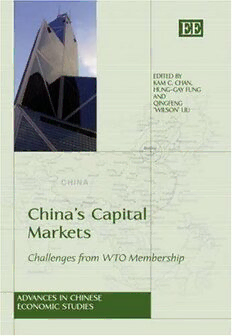
China's Capital Market: Challenges from Wto Membership (Advances in Chinese Economic Studies) PDF
356 Pages·2007·0.908 MB·English
Most books are stored in the elastic cloud where traffic is expensive. For this reason, we have a limit on daily download.
Preview China's Capital Market: Challenges from Wto Membership (Advances in Chinese Economic Studies)
Description:
China's accession agreements to the World Trade Organization promised to open up the financial sector to foreign competition by the end of 2006, affording a wealth of opportunities for domestic and international investors. However, there also exist inherent risks and challenges, including inefficient financial markets, inadequate and fast-changing regulations, excessive governmental influence, and lack of transparency in accounting and corporate governance. The contributors to this book explore these perplexing and intertwined issues as they systematically document and analyze the capital market's development in association with the banking system and legal framework. China's economy has been growing rapidly since the late 1970s and is expected to maintain this momentum in the foreseeable future. Coupled with the biggest population in the world, there is tremendous growth potential for China's capital markets and financial services industry, both vital to the continued development of the economy. The contributors present research on all facets of China's markets including: stock and bond markets; futures and over-the-counter markets; regulatory issues; and the development and roles of financial institutions such as brokerage firms, banks and insurance companies. Also addressed are the recent performance of equity markets, the emergence of small and medium enterprises, and the state banks' bids to be listed in overseas stock exchanges. Taken together, the book sheds a welcome light on China's overall economic growth. This comprehensive look at the future of China's economy will be of great value to students and scholars of China. Investors and policymakers will also find it of great practical use.
See more
The list of books you might like
Most books are stored in the elastic cloud where traffic is expensive. For this reason, we have a limit on daily download.
